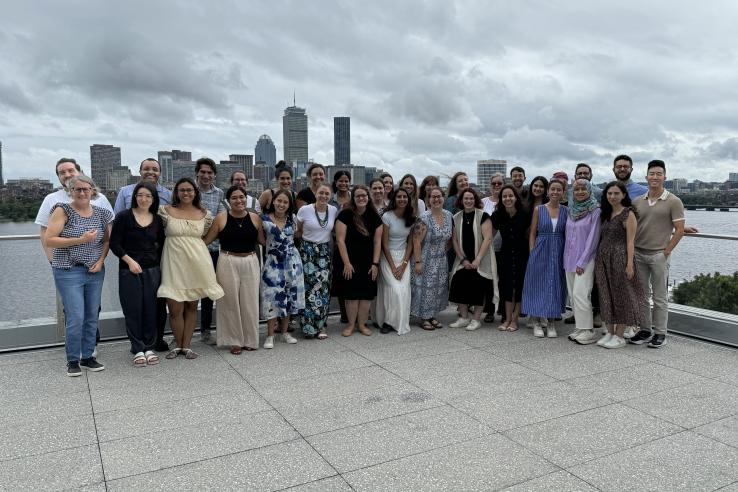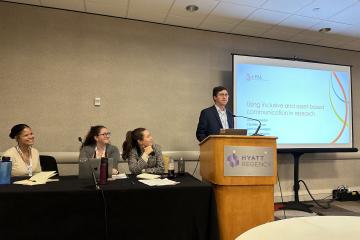J-PAL North America's DEI Working Group

Identifying and dismantling systemic racism and other forms of discrimination is essential to addressing the complex causes and consequences of poverty. In order to effectively advance J-PAL North America’s mission, we seek to equip our staff with a firm understanding of diversity, equity, and inclusion and the tools to center equity across our work.
Our Diversity, Equity, & Inclusion Working Group (DEIWG), founded by staff in 2017, plays a critical role in meeting these aims. As part of the broader J-PAL and MIT communities, we are committed to continuously learning from others doing this work. Please let us know your thoughts, questions, or comments.
Laura Feeney & Vincent Quan
Co-Executive Directors, J-PAL North America
Theory of Change
Our DEIWG is grounded in the following theory of change:
Need (the challenge we aim to address):
A diverse, equitable, and inclusive environment where staff’s contributions are valued and where they have the resources to do their best work.
Inputs (what we do to address the challenges):
Provide information, create space for discussion, develop and share resources, and help hold the organization accountable to its internal goals and values.
Outputs (what we accomplish):
Staff are educated about diversity, equity, and inclusion through reading suggested books and articles and by participating in trainings and discussions. Staff feel empowered to utilize the knowledge and information from these resources in their work.
Intermediate outcomes (how this work affects our organization):
Organizational structures and practices support open communication, collaboration, and inclusion, increasing staff’s sense of belonging and improving team cohesion. Staff understand and center these practices in their work.
Impact (how this work affects our mission):
J-PAL North America becomes more effective at achieving its mission by asking better research questions, supporting a more diverse network of researchers and partners, and promoting more creative and comprehensive ways of conducting research and changing policy.
Using this theory of change, we are working to achieve the following goals:
 Cultivate staff sense of belonging
Cultivate staff sense of belonging
J-PAL North America aims to foster belonging through a range of formal (e.g., celebrations, mentorship) and informal (e.g., shoutouts) activities and day-to-day interactions. We use an annual workplace climate survey to understand staff experiences with our workplace culture, enabling us to identify strengths and opportunities for growth. Results from the workplace climate survey inform annual work-planning prioritization across the organization.
Since beginning these efforts in 2019, the number of staff who report an ability to bring their whole, authentic selves to work has risen by 15 percentage points (a 22 percent increase). We are both pleased with our growth in this area and determined to continue improving in this area.
The percentage of staff reporting that J-PAL North America is able to recognize and eliminate even subtle forms of exclusion increased 38 percentage points (131 percent) between 2019 and 2023.
Read more about ways our office seeks to cultivate belonging
- Time is regularly set aside during weekly staff meetings for employees to share their name, pronouns, key responsibilities, communications preferences, and professional and personal interests. This activity helps ensure names are pronounced correctly and enables staff to collaborate more effectively and efficiently.
- Staff meeting agendas contain a regular written section for shoutouts, where employees can celebrate their colleagues’ hard work and voice their appreciation for their peers’ support.
- Staff are paired with a more tenured member of the team to provide professional development support and advice.
- As part of the MIT community, staff also have access to employee resource groups (ERGs), Employee Assistance Programs (EAPs), and other supportive resources.
 Improve hiring practices to maximize equity and representation
Improve hiring practices to maximize equity and representation
We continue to work towards a more diverse, equitable, and inclusive workplace through our hiring practices. As a network of researchers, a funder of research, and an organization that trains and supports economists in conducting randomized evaluations, J-PAL North America plays an important role in influencing what topics are studied, who conducts the evaluations, and how the research is implemented. This positionality enables us to create pathways for staff and researchers not only into J-PAL, but also into the broader field of economics.
Read more about how we're improving our hiring practices
- Our hiring team builds relationships with career services offices at universities, organizations and other groups aiming to broaden interest in economics and increase awareness of new positions.
- Our hiring team continuously learns new evidence-based strategies for inclusive and equitable hiring and adapts and improves our hiring practices to reflect these.
- We hire part-time paid undergraduate interns each semester. Internship opportunities address historical barriers to entry in the economics field, build skills for success in the quantitative social sciences, and provide insight into social science careers that leverage research to support communities.
 Educate our staff
Educate our staff
Through book clubs and workshops, we increase staff understanding of how inequity and exclusion manifest in our work—internally and externally. Together, we seek to gain tangible skills to center equity and inclusion across J-PAL’s policies, practices, and culture to improve the quality of our work.
Workshop examples
- The history of poverty, based in part on Alice O’Connor’s 2001 book Poverty Knowledge: Social Science, Social Policy, and the Poor in Twentieth-Century U.S. History. This training is held semi-annually for all new staff.
- Implicit bias
- Historical and contemporary exclusion and exploitation of Black people in the medical field
- Segregation, disparate funding, and differential outcomes by race and income in public education
- Stratification economics and how its tenets can be applied to other economic disciplines
- Using inclusive language in research and with each other
- Non-apparent disabilities, leveraging the work of Tiffany Yu
Book club topics
- The Black Agenda, edited by Anna Gifty Opoku-Agyeman
- Disparities in education and access to services among people in Puerto Rico
- Exclusionary history of Social Security
- How administrative burdens impact access to social services
- Tales of Two Americas, edited by John Freeman
- Poverty in the US
- Cash transfers and guaranteed income
- Racism in economics
- Racism in education
- White Supremacy Culture, by Tema Okun
 Communicate more inclusively
Communicate more inclusively
J-PAL North America strives to increase our internal capacity to communicate in an inclusive and asset-based manner with each other and external stakeholders. In addition, we aim to demonstrate our commitment to diversity, equity, and inclusion through our communications with current and prospective staff, researchers, and partners.
Read more about our DEI communications work
-
We developed an internal inclusive language guide, which we shared publicly and provided to collaborators when working on shared communications materials.
-
We’ve conducted several external trainings on using inclusive language in sharing research results (for example at the Association for Public Policy Analysis and Management’s (APPAM) 2023 annual conference).
-
We published a blog showcasing the work we’ve done over the past year as a way to build awareness for culture-building work at organizations like ours and to hold ourselves accountable to our goals.
Related content
We want to hear from you
To collaborate with us or provide feedback, contact DEI Working Group Chair at [email protected].
Acknowledgements
Our efforts towards building a more diverse, equitable, and inclusive workplace do not happen in a vacuum. We’d like to thank the many organizations and people who we have learned from and who have contributed to this work.







